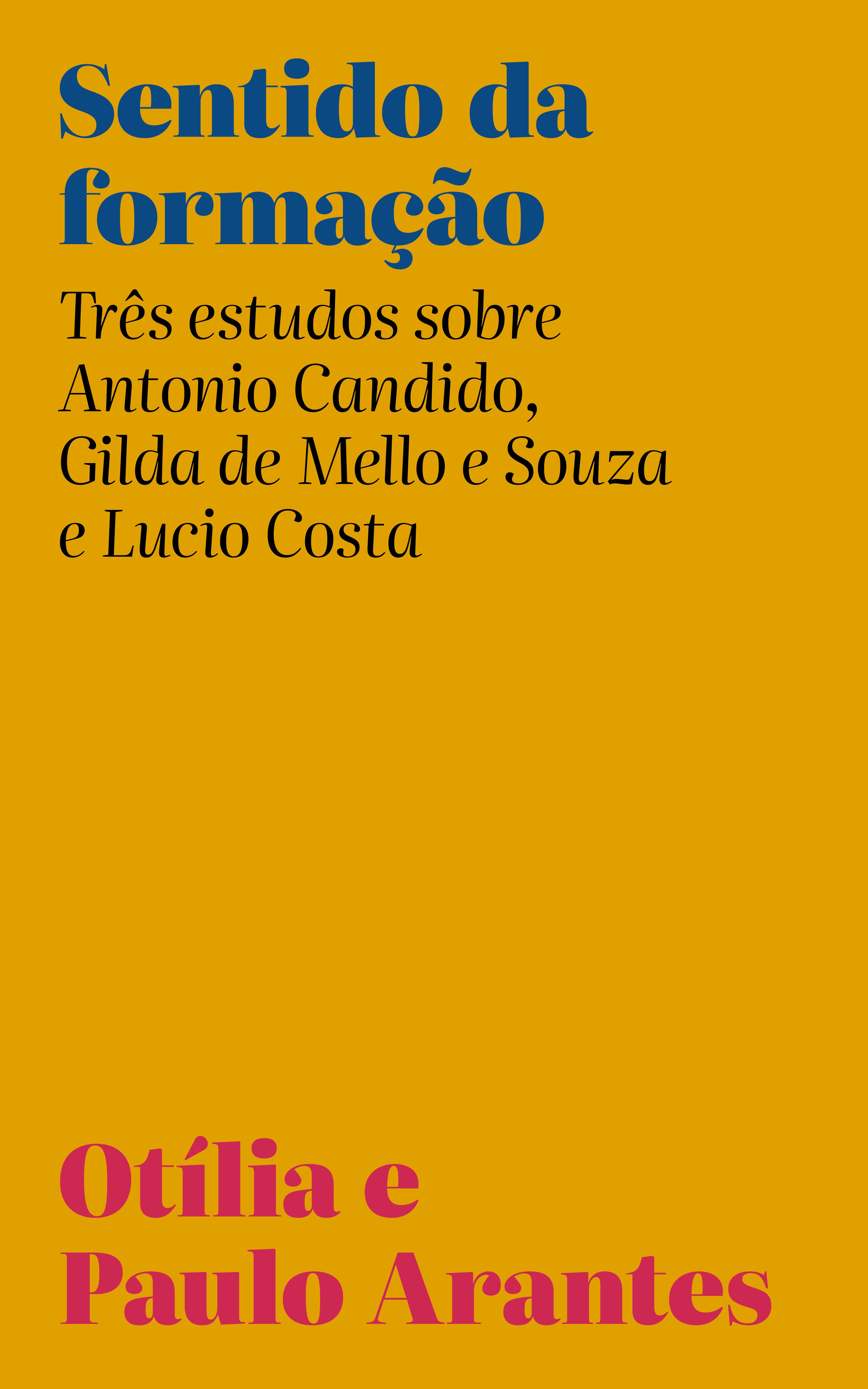Sentido da formação
Três estudos sobre Antonio Candido, Gilda de Mello e Souza e Lucio Costa
1997
Sinopse
O conceito de formação já foi “uma verdadeira obsessão nacional", como nos é explicado logo no início de O sentido da formação. Dos anos 1930 aos 50, a sociedade brasileira e suas estruturas foram dissecadas em termos histórico-econômicos, antropológicos e estéticos por intelectuais que, cada qual a sua maneira, procuraram estabelecer e dar sentido a uma situação nacional periférica, deslocada e, por isso mesmo, diferente. Assim, a Formação do Brasil contemporâneo (Caio Prado Jr.) pela primeira vez traçava em termos marxistas consequentes a estrutura social legada pela colonização; a Formação econômica do Brasil (Celso Furtado) explica os sentidos do atraso e os impasses do subdesenvolvimento; a Formação do patronato político brasileiro (Raymundo Faoro) revela os estamentos nos quais se assentavam nossas elites políticas. Foi em 1959, alguns anos antes do golpe de 1964 dar o ar de sua terrível graça, que Antonio Candido tratou de reunir essa experiência intelectual acumulada nas ciências sociais e no ensaísmo brasileiro (com o olho também nas obras precursoras de Gilberto Freyre e Sérgio Buarque) publicando sua Formação da literatura brasileira, que trazia para o campo da análise cultural aquelas mesmas preocupações e inaugurava a tradição crítica a qual o livro de Otília e Paulo Arantes retoma e investiga os pressupostos.
De Antonio Candido a Roberto Schwarz, formação significou um salto notável na compreensão cultural e política do Brasil, enfatizando a necessidade de analisar como entre nós se dá o processo de formalização estética de uma experiência histórica determinada. Foi dentro dessa nova tradição, contemporânea das conquistas especulativas já devidamente estabilizadas, do Modernismo, da imagem subversiva do Cinema Novo, do debate sobre os significados da abstração nas artes plástica e das ousadias da Nova Arquitetura, que redefiniu-se também, por força do salto a ser empreendido, a tarefa do crítico pautado pelo ideário, agora podemos dizer, dialético, do conceito de formação: compreender as vicissitudes da experiência cultural na periferia do capitalismo transcendendo a análise especializada (sem dela prescindir) visando respeitar a relativa independência do objeto, colhendo os saberes dispersos e fraturados nas esferas das humanidades, na cena contemporânea.
Pois é dentro dessa tradição e desses pressupostos que o leitor encontrará O sentido da formação, estudo que analisa a figuração da experiência cultural brasileira em três esferas (literatura, pintura, arquitetura) abordando aspectos desses movimentos artísticos, do século XIX ao XX, bem como as posturas e inflexões de seus primeiros grandes críticos: Antonio Candido, Gilda de Mello e Souza e Lúcio Costa. Nesse livro os autores acompanham, dentro da mais criteriosa leitura de obras, a maneira com que nossos melhores críticos, bem como nossos melhores artistas, vão criando formas de superar um certo estado de dependência, procurando estabelecer, a partir dos exemplos históricos anteriores, uma linha evolutiva que esclarece os dinamismos específicos da vida cultural brasileira, que aqui, vez por outra, aparece definida como diferença brasileira. Afinal de contas, é disso mesmo que esse livro trata, da “figuração paulatina de uma sociedade deprimida pela própria imagem”, uma sociedade onde, ontem como hoje, letra, figura, fundo, plano e monumento estão à procura de um país.
(Orelha de Francisco Alambert)
Esta edição virtual de Sentido da Formação, reproduz parcialmente a da Paz e Terra de 1997. Os ensaios sobre Antonio Candido e Lucio Costa são mantidos na íntegra, o ensaio a quatro mãos, sobre Gilda de Mello e Souza teve os apêndices suprimidos (estão incluídos no livro dedicado a Gilda publicado nesta coleção). Foi acrescentado ao final a entrevista com Ricardo Musse sobre o livro, publicada na Revista Praga, nº 4, 1997.
Palavras-chave:
Formação, Realidade Nacional, Ilustração brasileira, Grupo Clima, Antonio Candido, José Veríssimo, Eliot, Lúcia Miguel Pereira, Sílvio Romero, Gilda de Mello Souza, Lucio Costa, Pintura brasileira, Almeida Jr, Mário de Andrade, Roberto Schwarz, Arquitetura Moderna Brasileira, Oscar Niemeyer, Brasília.

Séries
Licença

Este trabalho está licenciado sob uma licença Creative Commons Attribution-NonCommercial-NoDerivatives 4.0 International License.


